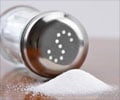A Goan researcher has claimed that the salt produced traditionally is better for health than iodised salt as it contains several important minerals.
A Goan researcher has claimed that the salt produced traditionally is better for health than iodised salt as it contains several important minerals.
Campaigners for iodised salt argue that salt produced naturally does not contain adequate amounts of iodine but Savita Kerkar of Goa University disagrees.She told IANS: "I have been conducting studies on traditional salts in Goa for the past two years. I have collected them from the majority of the 150 saltpans in the state and examined them in the laboratory. The traditional salts also contain naturally occurring iodine."
Natural salt is a source of 21 essential and 30 accessory minerals essential for health whereas refined salt contains only 0.1 to 0.5 percent of these elements, Kerkar said.
"I found that natural salt is superior and richer in naturally occurring iodine. It is lower in toxic metals and rich in 92 elements. Natural salt has all the standard requirements in terms of iodine content and mineral concentration," she said.
Kerkar's study is limited to the salt produced traditionally in Goa but she believes the same findings may be applicable to salt produced naturally in other parts of India.
India produces approximately 10 million tonnes of salt per year, Gujarat being the biggest production base. The other major salt producing states are Tamil Nadu and Rajasthan.
On Aug 15, 1997, the central government banned the sale of non-iodised natural salt for public consumption as per guidelines issued by the International Council for the Control of Iodine Deficiency Disorders. However, the ban was not implemented in Goa because of local opposition.
Source-IANS
LIN/V







